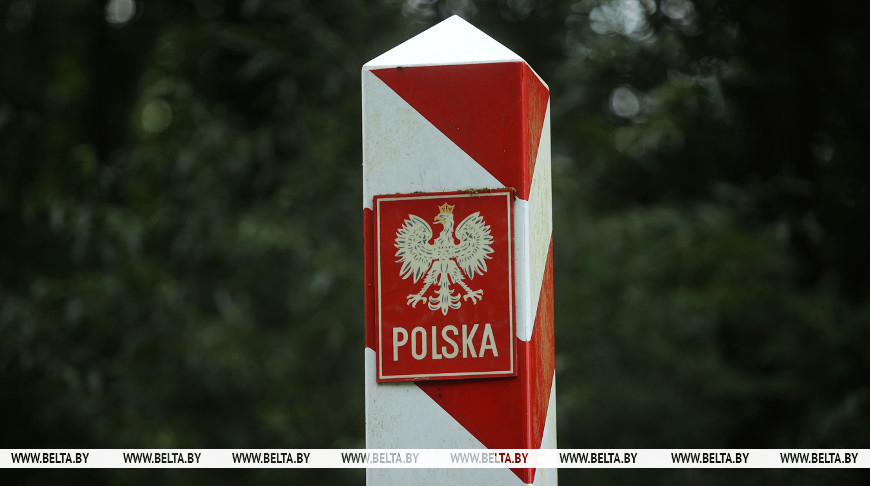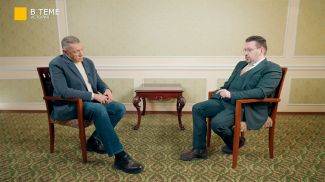
For the last few weeks Poland has been engaged in an interesting scheme involving multiple steps. On 13 June Poland introduced a buffer zone at the border with Belarus. A week later Polish President Andrzej Duda traveled to China to discuss, among other things, the situation with migrants at the Polish-Belarusian border. At the same time the Polish Ministry of Foreign Affairs announced the possibility of closing all the border crossings at the border with Belarus. Finally, last week just in time for the Shanghai Cooperation Organization summit involving the leaders of Belarus and China, Warsaw blocked transportation by rail at the customs clearance terminal in Malaszewicze, which is called “China’s gateway to Europe”.
But while trying to set snares for others, the Polish authorities trapped themselves. Warsaw has not achieved its goals, but has delivered a hit both to the country’s tourism and transit industries in one fell swoop. And the burden of reckless decisions will fall on the shoulders of ordinary Poles as always. But they are already used to it.
Act one. The buffer zone and consequences
Since 13 June the so-called buffer zone has been in effect on the Polish side of the Belarusian border. It is a section along the border over 60 kilometers long - in responsibility areas of the border guard stations in Narewka, Bialowieza, Dubicze Cerkiewne and Czeremcha. Unauthorized persons are forbidden to enter the buffer zone. The prohibition is valid for 90 days.
Warsaw explained the need to introduce the buffer zone by the need to ensure the protection of the state border amid the migration crisis, which Poland itself provoked. And now the Polish authorities are working hard to create new problems, primarily for inhabitants of their own country.
The creation of the buffer zone has already hit Poland’s tourism industry, local mass media reported.
“I have a dozen houses in the buffer zone near the border with Belarus. They were booked for vacations but now, after the buffer zone was introduced, all the tourists have refused to rent them. It is a huge financial blow,” the owner of a farm tourism complex told the publication Polonia Christiana.
Polonia Christiana calls the situation in the tourism industry catastrophic. Podlaskie Voivodeship has suffered the greatest damage. Tourist traffic has been reduced significantly. However, the introduction of the buffer zone also affects regions located tens of kilometers from the border. For example, Lublin Voivodeship, which territory is not included in the buffer zone.
The problem is that people are scared. According to Dorota Lachowska, director of the Lublin Regional Tourist Organization, tourists are guided by a sense of security when they choose a place for vacation. She believes that both locals and tourists have nothing to fear: the region is completely safe. Nevertheless, people are cautious. Therefore, if they book rooms in hotels, they do it right before arrival, which creates difficulties for the hotel industry in terms of work planning.
“The time the guests stay has also been significantly reduced. They spend only one or two nights in Lublin,” Lachowska said.
For Lublin Voivodeship the tourism industry is of great importance. About 3.7 million people visited the voivodship last year alone. Among them are foreign tourists, mainly from Germany, Israel, Italy, Spain and the UK.
The owner of a boat rental company located near the Polish town of Suprasl (about 80km from the buffer zone) said that many foreign tourists who had previously booked kayaks for rafting on the river had started to cancel their rentals.
“Tourists say: ‘Your country is a war zone, this is why it is dangerous to be here’. In my opinion, this misconception is the result of fear-mongering by mass media,” the businessman explained.
But in actual fact it is the Polish authorities that are the fear-mongers once again. Take for example the SMS alerts that both Polish residents and foreign tourists receive. While Poles receive messages simply reminding them not to enter the buffer zone, foreigners receive warnings that they may be fired upon.
“Attention! It is forbidden to stay on Polish territory near the border with Belarus. Unauthorized crossing is prohibited. Soldiers may use weapons. Turn back immediately!” was the text message a journalist from London received. She visited Podlaskie Voivodeship together with tourists from Germany, according to Money.pl. Is it any wonder that foreign visitors from Germany or the UK want to leave Polish territory as quickly as possible?
Back in June about 60 entrepreneurs from Podlaskie Voivodeship sent a collective letter to the local authorities. They asked to take action as soon as possible and provide assistance to hotels, guesthouses, farm tourism facilities, travel agencies, catering companies, and self-employed individuals engaged in tourism-related business.
Last week it was revealed that the Polish government had allocated funds for the development of tourism in Podlaskie Voivodeship after all. According to Polish Minister of Sport and Tourism Slawomir Nitras, the money will be used for promotional activities carried out by municipal authorities, tourism organizations as well as for a campaign in national mass media. The minister also hopes that Poles will show patriotism and visit Podlaskie Voivodeship to support the tourism industry and local entrepreneurs.
Whether advertising will help save the region’s tourism industry or not is open to debate. It is doubtful that foreigners will still be willing to travel to Poland after receiving a text message with a threat to be shot. The Polish tourism industry realizes it. This is why they demand tax exemptions or compensation for losses from the authorities. But the government is not ready to go any further than advertising in mass media.
The entrepreneur Ewelina Grygatowicz-Szumowska from the Polish business association United East doubts that the Polish government has any strategy for dealing with the migration crisis. “I am getting the impression that all actions are done chaotically and not fully thought out. I don’t know whether any consultations have been held and what consequences of these actions will be. The current government, which is a former opposition, went to polls with beautiful slogans that it would listen to the public, but I am not sure that this is the case now,” Grygatowicz-Szumowska said as she commented on the introduction of the buffer zone.
While talking about consequences of the buffer zone, it would be worth mentioning the topic of humane treatment of migrants, respect for human rights or international norms regulating migration policy. But only activists and human rights defenders in Poland bring these up.
In June the Polish authorities were approached by Commissioner for Human Rights in Poland Marcin Wiacek. He pointed out the risks of aggravation of the humanitarian crisis at the Polish-Belarusian border as a result of the introduction of the buffer zone. The ombudsman also pointed out the infringement of the basic constitutional freedoms of Poles such as freedom of movement within the Polish territory, freedom to choose one’s place of residence and stay, freedom of assembly and freedom to receive and disseminate information.
Wiacek stressed that the introduction of the buffer zone would make it difficult for NGOs and volunteers operating at the Polish-Belarusian border to provide humanitarian, medical and legal assistance to foreigners. In addition, the ombudsman disagrees with the fact that the ban on staying in the buffer zone applies to journalists. Thus, the Polish society is deprived of the right to receive reliable information about activities of state authorities in areas near the border.
As for humanitarian organizations, they do not hide their disappointment with the new Polish government. “After the change of government, nothing has changed from our point of view. This is very disappointing. We see some inconsistency on the part of the government. We all hoped to restore the rule of law, but the introduction of the buffer zone contradicts these declarations. This raises doubts that the current government will really fulfill all other promises regarding the rule of law,” the activist Kalina Czwarnog from the charity organization Fundacja Ocalenie told the Fakt publication.
The social movement Grupa Granica believes that the introduction of the buffer zone will allow Polish authorities to displace people with impunity, resorting to beatings, torture and driving migrants to death. “By imposing a state of emergency and then restricting access to border areas, the Law and Justice Party wanted to hide from the world large-scale violations of legislation and human rights as well as the massive use of violence against people who sought safety in Poland and Europe. Today Prime Minister Donald Tusk wants to do the same... The authorities will close our eyes so that we cannot document acts of violence and human rights violations,” Grupa Granica said in a statement.
However, the Polish authorities also have supporters. These are the nationalist organizations that patrol the border forests in search of migrants and “try to restore order with their own forces”. “We received information through social media that people from right-wing organizations are gathering here. We have met these people in the forest. They directly say that they come here to restore order,” the activist Joanna Sarnecka from Grupa Granica told the TOK FM radio station.
According to the activist, the fact that representatives of extreme right-wing organizations are patrolling the area is questionable and poses a serious threat. “It makes us wonder whether the state still exists and controls the situation,” the activist said.
Act two. Duda’s Chinese voyage
A week after the introduction of the buffer zone at the border, Polish President Andrzej Duda went to visit China. On the eve of the trip the Polish leader gave an interview to the local radio station Radio Zet. Duda said that he would discuss the situation at the border with Belarus with the Chinese leader Xi Jinping.
The fact that Belarus and China have reached the level of all-round cooperation is a well-known fact. Therefore, Warsaw apparently assumed that since it was impossible to put pressure on Minsk directly, it could try to do it through Beijing. Simply put: put pressure on China to put pressure on Minsk. At the same time, the Polish authorities believed that China’s Belt and Road Initiative or rather Poland’s importance for implementing this project would be a trump card in this case.
“Certainly, they [Chinese authorities] have their own capabilities for conducting political negotiations and exerting political influence. And we will definitely talk about this, too. Because today the land routes that pass through Poland are of great importance for China from the point of view of the Belt and Road initiative, which is a great economic and trade idea. One of the routes is practically closed - the one that goes through Ukraine. And that is why Poland is of key importance,” Duda argued.
However, the Polish leader’s arguments did not seem to gain traction in Beijing. Certainly, the Polish president was welcomed with all honors, given a podium and a microphone. The Chinese authorities also agreed to cancel short-term visas for Poles and lift the ban on the import of Polish poultry. And that, perhaps, was it.
No matter how much Duda tried to give weight to the agreements in China by calling the chicken meat shipment deal “the biggest in history,” results of the Polish leader’s visit look very modest.
“How can one assess the ‘Polish heyday’ in Beijing? The decision regarding visas for Poles had been expected. If the agreements focus only on the poultry industry, it is clearly not enough,” the Polish professor of Chinese studies Bogdan Goralczyk told the Fakt publication.
As for the situation at the border with Belarus, Duda had nothing to say after the visit. However, Polish Prime Minister Donald Tusk was satisfied even with the fact that Belarus had been mentioned during the conversation. He said that before the visit the government had provided the president with recommendations, including on the matter of China’s possible influence on Belarus.
“I am very satisfied with the president’s actions. The president has done everything to ensure that Chinese partners receive information about what Poland expects, for example, regarding China’s possible influence on Belarus,” the publication Bankier quoted Tusk as saying.
It is worth noting that there were no specific statements from Duda or Tusk in this regard. Only vague phrases that reflect aspirations more than results. At that moment it was already obvious that the scheme of the Polish authorities had failed miserably. And Warsaw’s further actions only confirmed it.
Act three. The blockade of Malaszewicze
Last week the Polish authorities seemed to have moved on to the third act of the play. On 3 July Polish Minister of Foreign Affairs Radoslaw Sikorski said that he did not rule out the possibility of closing the border with Belarus for freight shipments. At the same time Polish media reported that Warsaw had organized a blockade of railroad traffic at the customs clearance terminal in Malaszewicze at the border with Belarus.
The terminal in Malaszewicze is often referred to as a “dry port” or “China’s gateway to Europe”. Up to 90% of the goods shipped from China to the EU pass through the place.
According to the Polish radio station RMF FM, the blockade of rail traffic in Malaszewicze lasted for 33 hours. Officially the customs service reported that routine control measures were in progress to protect the EU customs territory from incoming dangerous goods or substances. The content of the containers that entered Poland via Belarus (mostly from China) was carefully checked.
Polish diplomatic circles told RMF FM journalists that the Malaszewicze blockade had a specific purpose: to show that Polish authorities could block rail transit from the east to the European Union.
“We are counting on China’s pressure on Minsk. China could lose if the terminal in Malaszewicze is blocked. This is where Chinese goods get to the West by land,” RMF FM reported.

In fact, the Poles had tried to play the terminal card in Malaszewicze before. In summer 2023 Warsaw demanded that Minsk resolve the problem of the migration crisis. In fact, the Polish authorities demanded that Belarusian authorities should protect the European Union at the border between Belarus and Poland. The way it had been done for years before the introduction of Western sanctions.
To make the demands more convincing, Warsaw threatened to close border crossings with Belarus. However, the decision was never implemented. After all, blocking the borders would have dealt a serious blow to the Polish economy and the Polish private sector, which already had a hard time after the introduction of anti-Belarusian sanctions.
Polish experts criticized Warsaw’s initiatives. For instance, the chief economist of the Polish Chamber of Commerce (KIG) Piotr Soroczynski noted that both the Chinese and the Europeans were interested in the transit potential of Belarus. “In this situation Poland may face pressure from our Western partners. A new Silk Road passes through Belarus, thanks to which goods from China reach the European Union. Therefore, both China and our EU partners depend on transit through Belarus,” noted Soroczynski.
In his opinion, the blockade of railroads, in particular the terminal in Malaszewicze, will hit Western countries particularly hard. At the same time, Beijing will use its influence on Berlin and Paris to preserve transit.
Kazimierz Zdunowski, head of the Polish-Belarusian Chamber of Commerce and Industry, agrees. “I don’t understand how the closure of Malaszewicze will affect Belarus. This is a terminal connecting Europe with China. Closing the freight connection will undermine confidence in Poland from the entire East. Are we really ready to take such steps? Can we afford such a gesture?” the expert wondered.
He also noted that the closure of borders by Europe would encourage Belarus to further redirect its export to the East. “We are already losing the market, and Polish entrepreneurs in Belarus are actually being replaced by companies from Turkey, Russia or Kazakhstan,” Zdunowski emphasized.
The closure of borders with the European Union will not be a disaster for Belarus. The Belarusian economy will continue operating while focusing on Russia, China and other Asian countries, the expert summarized.
What will happen to the Polish economy in this case? For some reason government officials in Warsaw are unwilling to talk about it. But will it be possible to continue hushing up the problems?
It is symbolical that another piece of news came out of Poland on 3 July. The country’s largest rail freight carrier PKP Cargo is preparing to lay off up to 30% of its employees, which makes up 4,142 workers. But judging by the way the Polish authorities are killing their transit industry, the remaining 8,000 employees of PKP Cargo should also think about finding a different career. Like the employees of the seaport in Gdansk, which receives Chinese cargo from Malaszewicze.
Is the play over?
The main misconception of the Polish authorities is the blind belief that Warsaw has some leverage. In fact, there is nothing unexpected in Warsaw’s actions. Warsaw uses the same tactics of blackmail and threats, against which Belarus has already developed immunity.
On 2 July Belarus President Aleksandr Lukashenko once again reminded the Polish authorities that they would not be able to use the migration crisis against Belarus.
“Why am I speaking about this problem? Because today it is used to pressure us in the West. Particularly our ‘friends’, our closest neighbors are working hard on it: Poland’s leadership,” Aleksandr Lukashenko explained. “They have already gone so far that… President Duda went to Xi Jinping and complained about Lukashenko. He asked Xi Jinping to influence Lukashenko and Putin so that they would end this migration.”
The president reminded that Belarus had been very seriously cooperating with the West before the West introduced sanctions against Belarus. Cooperation went as far as the signing of a readmission agreement. “Then all of it was scrapped [by the West]. ‘We don’t need that.’ Okay then. Do I need it?” Aleksandr Lukashenko said. “We will not restrain them.”
Apart from that, the migrant traffic has been influenced by the aggravation of the conflict in Ukraine. “One way or another the land routes converged in Belarus. And I said it plainly: we are not going to catch them. Our job is to ensure the security of our own nation,” the Belarusian leader said.
The head of state warned that it is futile to use the migrant crisis in an attempt to pressure Belarus.
Poland’s attempts to manipulate China, a country in a completely different weight category, which also has ample room for maneuver, also look absurd. Poles could see it on 3 July when the leaders of China and Kazakhstan launched freight transportation to Europe along the Trans-Caspian route.
It would be a good time for our Polish neighbors to think about how to preserve their transit appeal in the eyes of China rather than throwing up roadblocks.
Of course, the probability that the Polish authorities will decide to block the border with Belarus is extremely low. Even when the terminal in Malaszewicze was blocked, the Poles acted under the guise of “routine operations”. At the same time, when he was in Beijing, the Polish president repeatedly emphasized that the Belt and Road initiative, which ensures the delivery of Chinese goods to Europe, as well as exports from Europe to China, opens up huge opportunities for Poland’s economic development.
Another thing is how Warsaw’s manipulations and ultimatums look in the eyes of China. And whether the Chinese private sector is ready to consider Poles as serious and reliable partners. After all, as you know, reputation takes years to build, but you can lose face in an instant.













